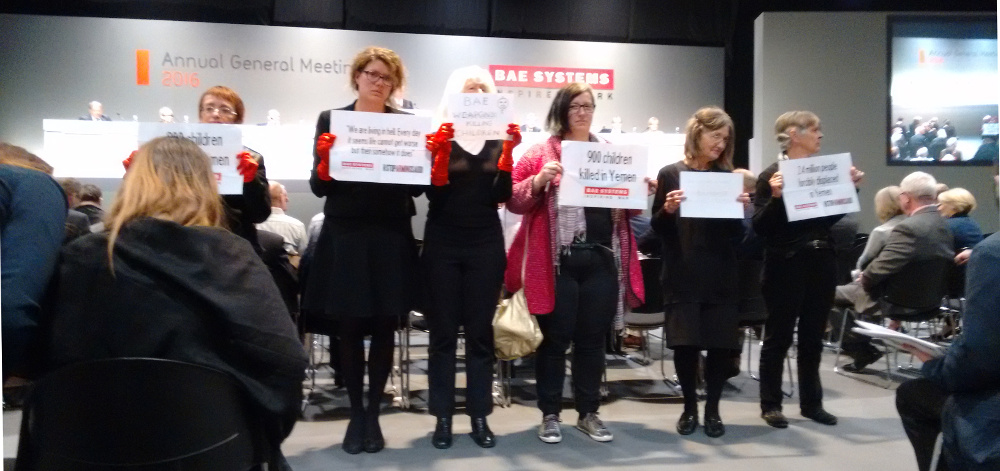CAAT is a non-violent organisation. It is highly recommended that participants in civil disobedience, creative direct action, and Non-Violent Direct Action (NVDA) should take part in training before the action.
General guidelines
Occasionally, specific agreements or guidelines are made by CAAT for particular actions or protests. However, for all CAAT’s activities these general guidelines apply:
- Everyone is welcome to take action with us, regardless of whether they have any previous experience of non-violent protest. We welcome everyone who enters this space with the aim of challenging the arms trade (and committed to these guidelines) as an equal participant in our movement. We believe each of us has something to contribute and something to learn. We are a collective based on trust, respect, and taking responsibility for our actions.
- Safety is key. We will act in a way that minimises the risk of harm to ourselves and others. For example, if roads are blocked, we will ask drivers to turn off their engines. We also consider any behaviour which demeans, marginalises, threatens or harms anybody as oppression, and we commit to challenging it. This includes (among many other examples), racism, misogyny, homophobia, transphobia, Islamophobia, antisemitism, ableism.
- We will not engage in or encourage others to engage in physical violence or verbal abuse towards any individual, or undertake actions which jeopardise another’s safety.
- We will direct our protest at those who hold influential and powerful positions in the arms industry, like the government, arms companies, arms traders, people with senior positions in arms companies.
- We won’t carry weapons.
- We will not bring, consume or participate under the influence of alcohol and / or drugs (except for medical purposes) on CAAT demonstrations or actions.
Interactions with the police
We recognise that the police record a variety of information, or ‘intelligence’ on people attending protests. This information is retained and shared with other police forces, government institutions and, in some cases, private companies. Police Liaison Officers (PLOs) are police officers sent to gather intelligence. They are sometimes tasked with asking protesters for information that can later be used to prosecute them. For these reasons, we strongly advise people to avoid conversations with the police where possible as they may share information through casual conversation that puts themselves and others at risk. Although some people may feel comfortable taking this risk as an individual, they may inadvertently put others at risk without their consent. For more information, see the Green and Black Cross resources page.
We will remain aware:
- that the police protect the arms trade,
- that the police are part of the arms trade (police forces from across the world attend arms fairs like DSEI),
- police forces across the world are increasingly militarised, and this represents a threat to our communities,
- that the police are institutionally racist, and as a result, often people of colour are treated differently on demonstrations than white people,
- that the police react differently depending on an individual’s race, sex, gender, class, religion, age, or other aspects of their identity such as migration status,
- that the police collect, store, and process information on our movements and individuals that put us all at risk.
We will strive to act in solidarity with all those who have experienced violence from the police, or are likely to in the future. This means:
- We will not share information about other individuals or groups with the police.
- We will make sure we know and assert our own and one another’s rights, and
- We will question individual officers and the wider police operation surrounding our action in order to hold them to account/in order to assert our right to protest.
If these guidelines are not adhered to, CAAT retains the right to ask people to leave the given event or remove the offending words.

